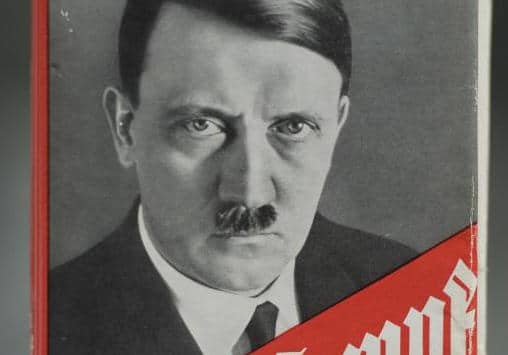
Despite calls to refrain from bringing Adolf Hitler’s Mein Kampf book back on the market, the limited edition autobiography has become an instant sell out since first coming out in bookstores since World War2.
To date more than 15 000 advance orders were placed, despite an initial print of 4000 copies.
The two volome anti semitic book, ‘My Life’ written between 1924 and 1926 outlining the former 1930’s National Socialist leader’s political ideology and future plans for Germany and claims of a global Jewish conspiracy only made it public after coming into public domain on January 1. Until then the state of Bavaria out of respect to the victims of the Nazi’s declined to republish the book. Technically the book was never banned but reprinting until now had been forbidden.
In it, the The two-volume political treatise, which was written between 1924 and 1926 and posits a global Jewish conspiracy,
Prior to the book coming out, many had called for its boycott whilst others argued that it was long overdue to lift the ban of book.
Reflected Ian Kershaw, a leading biographer of Hitler: ‘Censorship is almost always pointless in the long term in a free society, and only contributes to creating a negative myth, making a forbidden text more mysterious and awakening an inevitable fascination with the inaccessible.’
Germany’s main Jewish group, the Central Council of Jews, said it has no objections to the critical edition in which the revised annotated book which took three years to create, nevertheless support ongoing efforts to prevent any new ‘Mein Kampf’ without annotations. Its president, Josef Schuster, said he hopes the critical edition will ‘contribute to debunking Hitler’s inhuman ideology and counteracting anti-Semitism.’
Copies of a 2,000-page, two-volume annotated version of Mein Kampf went on sale on January 9
The new version, which will cost 59 euros ($64 USD), has some 3,500 annotations.
Authors argue that the critical edition will serve to ‘deconstruct and put into context Hitler’s writing‘ with the aim to demystify the 800-page original body of work.
Addressing why it sought to re introduce the book, the publishers, the Institute of Contemporary History Munich-Berlin (IfZ), told it wanted to demystify the book, saying: ‘This critical edition of ‘Mein Kampf’ should be understood as a contribution to the historical and political enlightenment. The aim is to deconstruct Hitler and his propaganda in a sustainable manner.’
Others in the interim have even called to re introduced the book in German classrooms, with Education Minister Johanna Wanka saying it would serve to ensure that ‘Hitler’s comments do not remain unchallenged’.
Adding: ‘Pupils will have questions and it is only right that these can be addressed in classes.’
But the Jewish community in Germany criticized the decision to reprint the anti-Semitic book, questioning whether it’s necessary to propagate what many consider inflammatory material.
Not everyone is happy with the release of the critical edition, with many Jewish groups questioning why academics and historians sought its wider release, arguing that the academia already have access to the book’s text.
Reflected Charlotte Knobloch, chair of the Jewish Community of Munich and Upper Bavaria: ‘The book is a Pandora’s box, which should be closed forever in the ‘poison cupboard’ of history.’
While the new critical edition may have once again reignited debate as to whether to bring out books which pillorize one sector of society, its new sales hardly compare to bygone era sales in which Mein Kampf became a bestseller in the 1930s all the way until the mid 1940’s.
By the end of WW2 the book would lead to 12 million copies being sold as an entire nation partly under the influence/subjugation of a charismatic leader soaked up their idol’s ambitions whilst others tried to make sense of the degree of destabilization immediately after WW1 which led to vast internal strife within the nation. Strife in some ways which has fully never dissipated as the nation now points at their discontent with Muslim migrants undercutting greater and parallel woes and existential apprehensions.






